|
|
UK readers, exciting news; I have five signed ARCs of The Ill-Made Knight to give away! This book sounds fantastic and I can’t wait to dig into my copy. It’s not due out until the 1st of August, so this is your chance to read a great work of historical fiction before it hits the book store. 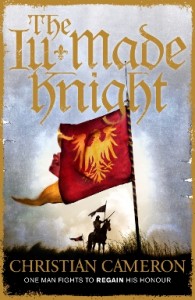 Here’s the description: Here’s the description:
An action-packed tale of chivalry and betrayal set during the Hundred Years War. William Gold comes into the world as his family slides down the social ladder. His head filled with tales of chivalry, instead he is branded a thief, and must make do with being squire to his childhood friend Sir Robert, a knight determined to make a name for himself as a man at arms in France. While William himself slowly acquires the skills of knightly combat, he remains an outsider – until the Battle of Poitiers when Sir Robert is cut down by the greatest knight of the age, Sir Geoffrey de Charny, and William, his lowly squire, revenges him. But with his own knight dead, no honour acrrues to William for this feat of arms, and he is forced to become a mercenary. Scavenging a mis-matched set of armour from the knightly corpses, he joins one of the mercenary companies now set to pillage a defenceless France, and so begins a bloody career that sees William joining forces with the infamous Sir John Hawkwood and immersing himself in a treacherous clandestine war among the Italian city states. But paradoxically it is there, among the spies, assassins and hired killers serving their ruthless masters, that William finally discovers the true meaning of chivalry – and his destiny as a knight.
To win one of the five signed ARCs, please fill in the following form. Just let me know what your favourite period in history is. Winners will be selected by random lottery and you’ll be contacted by me within 24 hours of the contest’s close so that I can find out your address. The contest closes on the 3rd of July. Good luck!
If you can’t see the form, please visit this link to enter.
Since I wasn’t able to hold a giveaway in honor of my recent blogoversary, I decided to offer one belatedly! I thought I’d giveaway a few of the historical fiction books I’ve reviewed and am about to review over the next few days. It’s a flash giveaway – the prizes are in the US and I’d like to send them on Friday, so the contest is only open until tomorrow (Thursday July 28th) at 12 noon EST. Open only to those with a US address – sorry, I am going to run an international giveaway soon!
I have two prize packs of two books each, so there will be two winners!
One winner will receive:
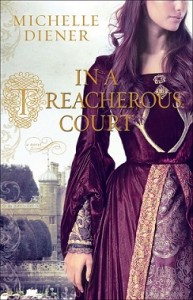 
I read The Queen of Last Hopes and really enjoyed it, while In a Treacherous Court is set to release next week and I’ll be reviewing it then! These are both ARCs and gently read.
The second pack consists of:
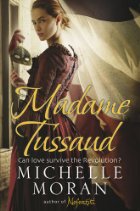 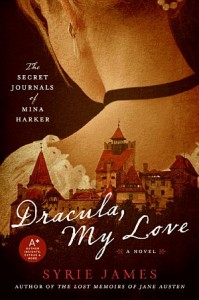
I loved Madame Tussaud and, while Dracula, My Love wasn’t my favorite, many other bloggers read and enjoyed it. The first is an ARC, the second is a finished copy, and neither have been read.
To enter, please just fill in the form below!
 What would happen if we twenty-first century people took a trip back in time to the fourteenth century? It would be very like visiting another country. Even our landscape would be greatly changed. Ian Mortimer takes this approach and, applying his theory of living history, treats his readers to an objective and entertaining view of one of the most stereotypical centuries in medieval history. The fourteenth century has not only castles, knights, tournaments, and wars, but also gave birth to many of the creative minds associated with medieval England like Chaucer and the Gawain-poet. What would happen if we twenty-first century people took a trip back in time to the fourteenth century? It would be very like visiting another country. Even our landscape would be greatly changed. Ian Mortimer takes this approach and, applying his theory of living history, treats his readers to an objective and entertaining view of one of the most stereotypical centuries in medieval history. The fourteenth century has not only castles, knights, tournaments, and wars, but also gave birth to many of the creative minds associated with medieval England like Chaucer and the Gawain-poet.
Living history is a fascinating idea. Instead of applying modern stereotypes to medieval practices, Mortimer attempts instead to understand them on their own terms. For example, a popular perception is that medieval people were dirty. In comparison to us, they were; most people did not bathe on a daily basis, nor did they have detergents and disinfectants to clean their houses or clothes with. From a medieval perspective, however, women spent hours working to clean their homes, clearing rushes from the floor, scouring pots and pans, and laundering clothes with a variety of harsh soaps. Men and women washed their hands and faces daily and even started to use perfumes. They ate politely, especially in the presence of their social betters. To them, that was cleanliness. There were, of course, smelly or messy people, but there are smelly and messy people now too.
Mortimer’s book is divided into eleven chapters, covering such topics as the landscape, the medieval character, health and hygiene, and the law. He uses examples to illustrate his points, such as a genuine medieval gang that evaded the law or examples of a few women who broke out of the status quo and became unusually wealthy and powerful. Queen Isabella is the second richest person in the century; quite remarkable when women were regarded as property of their husbands and fathers. He also attempts to convey the tragedy of the plague; while other historians may evaluate it for its effect on history, which was largely beneficial, Mortimer shows us how it was anything but that to the third to half of the population that died from it and their relatives, who watched them die and mourned for them. Mortimer even imagines a few conversations that travellers might have, for example, when bartering for food.
My favorite section, however, was the chapter on clothing. Using illuminated manuscripts and tapestries, Mortimer shows how the style of dress changed drastically from the beginning of the century to the end. Clothing more than anything enables me to visualize the people described in the book and, in my experience, is rarely mentioned in detail in schools or museums as few examples survive. I loved learning how the invention of the button changed clothing styles and how people moved gradually towards more provocative styles, which were of course disapproved of by clergy and the elderly.
This is certainly history worth reading. It’s not heavy at all and is a perfect read for the non-academic who wishes to learn a lot more about the Middle Ages but doesn’t have the patience for a more serious, longer study.
I loved this book so much that I’m going to be discussing it on That’s How I Blog with the wonderful Nicole on June 8th at 4 pm EST. Do you want a copy of your own to discuss with me? Thanks to Simon & Schuster, I have 3 copies to give away to anyone with a valid US mailing address. To enter, just leave a comment on this review. This contest will be open until February 8th. The winners are commenters 3, 6, and 32 thanks to random.org. Congratulations to Lindymc, The Kool-Aid Mom, and Alyce!
This review was originally posted at The Book Bag and I’d like to thank them for my review copy.
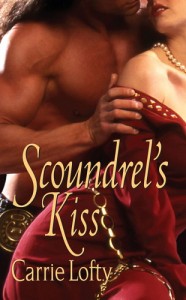 Yesterday, I reviewed Carrie’s newest book, Scoundrel’s Kiss. I also had the pleasure of interviewing her recently and I hope you all enjoy the answers as much as I did! Yesterday, I reviewed Carrie’s newest book, Scoundrel’s Kiss. I also had the pleasure of interviewing her recently and I hope you all enjoy the answers as much as I did!
1. I loved that Scoundrel’s Kiss was set outside the typical locations for a historical romance. Why did you choose to set it in medieval Spain?
It’s set in the Kingdom of Castile, which comprises part of modern-day Spain. Thinking back, I don’t remember exactly what first started me thinking about Spain as a setting, but I knew I wanted to feature two elements to this story: a warrior monk and an opium addict. That meant I needed to find a place where their love could blossom. Spain was not only a hotbed of religious and military activity in the 13th century, but it was also along Arab trade routes. The Arabs traded with the Chinese, which mean that opium was available for purchase in Spain. Ta-dah! I’d found my setting.
2. Ada is a far cry from the average blushing virgin heroine. Was it a difficult task for you to make an opium addict a sympathetic character?
Yes, Ada is…trying. It was difficult making her sympathetic, in that I disliked how Ada behaved toward the finale of my Robin Hood-themed debut, WHAT A SCOUNDREL WANTS. She makes her sister, Meg, make a really unfair choice, and her behavior is downright selfish. So I wasn’t in a sympathetic place when I sat down to write her love story. But then I remembered an old saying about villains: the villain is the hero of his own story. That jolted me into taking Ada’s side, so to speak, and learning where she was vulnerable, why she was hurting so desperately, and how I could help redeem her. In the end, I think her happily ever after is justly deserved, if only for how hard she works at earning it.
3. When it comes to writing, do you plot out your books carefully or does the story come to you as you go?
I start with the setting. Always. Then I research and brainstorm in tandem, trying to find my characters. What sort of people *could* have lived in this time and place? Are they native? Just passing through? There for the long haul? Bored and desperate to get out? Once I have the setting and the characters very firm in my mind, then I start writing and never look back. You could call me a prepared pantser!
4. Do you have a particular favorite time period in history?
I’ll always have a fondness for the American Old West. I did my master’s thesis on the lives and legends of Jesse James and Wild Bill Hickok, and how their stories helped shape American culture after the Civil War. Plus I was a sucker for western-set romances when I was a teenager, back when they were *everywhere*. I haven’t yet tried my hand at a western of my own, but I can’t help but think that I will someday. That period of history has been such a part of my life!
 5. Are you planning on returning to any of the characters in Scoundrel’s Kiss for another book? What’s next for you? 5. Are you planning on returning to any of the characters in Scoundrel’s Kiss for another book? What’s next for you?
I’d like to continue with Jacob’s story, and then to find a partner for Blanca, but that remains to be seen. Otherwise, my historical romance set in Napoleonic Austria will help launch Carina Press, Harlequin’s new all-digital venture, in June. In it, a widowed violin prodigy begins a steamy affair with the renowned composer she’s always idolized, only to learn that he stole the symphony he’s most famous for. In addition, I’m co-writing with Ann Aguirre under the name Ellen Connor (http://EllenConnor.com). We write hot-n-dirty apocalyptic paranormal romances, and our “Dark Age Dawning” trilogy will be coming soon from Penguin.
6. What do you suggest we read while waiting for your next book? Any favorites you’d like to share with us?
I love lush, beautiful writing, so my favorite romance authors are Candice Procter, Penelope Williamson, Laura Kinsale, and Patricia Gaffney. They all craft such amazing stories, not simply packed with emotion and fascinating characters, but with poetic language to describe every aspect of the hero and heroine’s lives. I read those books and knew that’s what I wanted to write. Those are the kinds of stories I love to read, so why not give them a try in my own style with my own unique voice? I’d unabashedly recommend any of their books to those who haven’t yet read them!
Thanks for stopping by, Carrie!
To win a copy of Scoundrel’s Kiss for your very own, just leave a comment. There is one up for grabs. Readers in the US and Canada will receive a signed copy, whereas international readers will receive an unsigned copy from the Book Depository. Make sure you leave a valid email address in the “email” field of the comment form to win. This contest will be open until January 26th. Good luck! The winner of this contest is Lana.
 Catherine Howard has grown up in the country, a relatively insignificant member of an incredibly powerful family. After the death of her cousin Anne Boleyn, the Howard family fortunes fell to some extent, but in 1540, things are about to change. Catherine’s uncle, the duke of Norfolk, brings her to court at age seventeen, when she is at her most beautiful, white-washing her reputation and placing her before the king. Catherine is no innocent but King Henry VIII falls in love with her, convinced that she is his rose without a thorn. When the members of her past come to court intent on blackmail, Catherine’s road to tragedy is assured. Catherine Howard has grown up in the country, a relatively insignificant member of an incredibly powerful family. After the death of her cousin Anne Boleyn, the Howard family fortunes fell to some extent, but in 1540, things are about to change. Catherine’s uncle, the duke of Norfolk, brings her to court at age seventeen, when she is at her most beautiful, white-washing her reputation and placing her before the king. Catherine is no innocent but King Henry VIII falls in love with her, convinced that she is his rose without a thorn. When the members of her past come to court intent on blackmail, Catherine’s road to tragedy is assured.
This story is a familiar one for many Tudor enthusiasts, and clearly I’m no exception. I was looking forward to reading Haeger’s portrayal of this young queen. Considering Catherine probably slept with a variety of men, I would think it would be difficult for her to be a sympathetic character, but Haeger makes it look easy. She creates a Catherine that readers will wish had a different ending. Despite her sexual experience, Catherine does seem innocent and naive at times, completely a pawn for her powerful uncle and the Howard family strategy to gain favor. Once she’s gained the eye of the king, there is no looking back for this girl. Her downfall is indeed tragic because Haeger’s Catherine wishes in every instance for something different. When she finally settles into her role as queen and begins to hope she can be good for Henry and for the country, that hope is snatched away from her by her past.
While most of the third person narrative is focused on Catherine, we do occasionally get glimpses into the other characters’ heads, particularly that of Thomas Culpeper. The other characters are not quite so well-defined, but each of them feel intriguing and real, and this is a Tudor world that feels largely authentic and familiar. I enjoyed the rich descriptions, especially of Catherine’s dresses, and felt I could picture all of the players moving about the court, ambitions intact. The plot unfolds in a sensible way; virtually everyone who is interested in Tudor history will know that Catherine was beheaded by Henry VIII, so the book opens on the night before the execution. It then returns to the time when everything began to change for Catherine and the author can explain how she got to that point in her own way. It’s very well done and the book is a pleasure to read. Perhaps my only qualm with it is that Catherine never seems bothered by the fact that she sleeps with every man who looks at her twice. She does it out of boredom, but surely she must worry about pregnancy at the very least. No one seems to lament the loss of her virginity except as it pertains to the king, which did seem strange to me since surely any other nobleman would like his wife to be a virgin, but it’s only a minor part of the story.
Overall, I would recommend The Queen’s Mistake to Tudor enthusiasts and other fans of historical fiction. It’s a well-written peek into the past, with sympathetic characters and an engaging sense of history.
Do you want a copy of your own? Leave a comment here saying you’d like to enter and you can win one of two trade paperback copies from the publisher. This contest is only open to those with a US address and will be open until November 11th. Good luck!
I received this book from the publisher for review. I’m an Amazon Associate.
 As the eldest daughter of Edward IV and wife of Henry VII, Elizabeth of York presents a link of continuity between the extravagant Yorkist rule and the more conservative Tudor dynasty. At one time, two would-be kings competed for England’s crown, and with it Elizabeth’s hand in marriage. The Battle of Bosworth Field changed the course of history and Elizabeth’s role was in the very center of English politics. Margaret Campbell Barnes imagines how Elizabeth may have felt and reacted to her pivotal position, giving this occasionally neglected queen a voice of her own in one of the most recently popular periods in English history. As the eldest daughter of Edward IV and wife of Henry VII, Elizabeth of York presents a link of continuity between the extravagant Yorkist rule and the more conservative Tudor dynasty. At one time, two would-be kings competed for England’s crown, and with it Elizabeth’s hand in marriage. The Battle of Bosworth Field changed the course of history and Elizabeth’s role was in the very center of English politics. Margaret Campbell Barnes imagines how Elizabeth may have felt and reacted to her pivotal position, giving this occasionally neglected queen a voice of her own in one of the most recently popular periods in English history.
I’ve mentioned before that the Wars of the Roses are the latest popular trend in historical fiction. I’m fairly pleased with this as it’s my own area of special interest and I like to see how different fiction writers have portrayed all of these characters with whom I am so familiar. Sourcebooks’ release of The Tudor Rose comes at a perfect time and despite the fact that it was written years ago, it isn’t very dated. Interestingly, Barnes interprets history in ways that stray wildly from today’s popular positions. For example, Henry VII’s mother Margaret Beaufort, often portrayed as a tyrant who controlled her son and stifled his wife, is here a friend to Elizabeth, and Elizabeth happily allows Margaret to tend to those nasty administrative tasks that she would rather miss out on. Elizabeth herself is a charming character. She is fairly quiet and submissive but she loves deeply and she has a great deal of courage and strength. As readers, we want her to find love and happiness, because she is clearly so deserving of it.
In terms of plot, The Tudor Rose follows the life of Elizabeth of York from her childhood engagement to the French dauphin to a point within a year of her death. As such, there isn’t really any sort of tension; many readers will know how the story ends. It could feel slow, but it’s a very pleasant journey, and a lovely imagining of the late fifteenth century. The book feels rich with detail, fine gowns and palaces, and will surely appeal to those of us who love to read about royalty. And it’s always worth finding out what another author has done with the Princes in the Tower, particularly given that this book has a long enough timeline to include the revolt against Henry VII by Perkin Warbeck.
In short, The Tudor Rose is a wonderful historical read and well worth curling up with for immersion into another world, if not for those who crave excitement in their books.
Would you like to win a copy of your own? Sourcebooks is sponsoring a giveaway of one copy to a US or Canadian address. No P.O. boxes please! Just leave a comment to enter. This contest will run until midnight on October 20th. The winner of this contest is Stephanie.
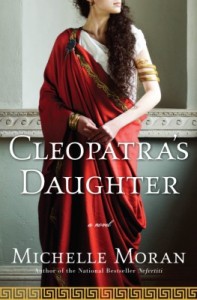
As you may have guessed if you have been reading my blog long enough, I’m a huge fan of Michelle Moran’s work. I just finished Cleopatra’s Daughter and I found it to be another great read, which is wonderful but no surprise! So I’m very excited to offer you the chance to win a signed, hardcover copy of your own. Here is the publisher’s blurb:
The marriage of Marc Antony and Cleopatra is one of the greatest love stories of all time, a tale of unbridled passion with earth-shaking political consequences. Feared and hunted by the powers in Rome, the lovers choose to die by their own hands as the triumphant armies of Antony’s revengeful rival, Octavian, sweep into Egypt. Their three orphaned children are taken in chains to Rome; only two– the ten-year-old twins Selene and Alexander–survive the journey. Delivered to the household of Octavian’s sister, the siblings cling to each other and to the hope that they will return one day to their rightful place on the throne of Egypt. As they come of age, they are buffeted by the personal ambitions of Octavian’s family and court, by the ever-present threat of slave rebellion, and by the longings and desires deep within their own hearts.
The fateful tale of Selene and Alexander is brought brilliantly to life in Cleopatra’s Daughter. Recounted in Selene’s youthful and engaging voice, it introduces a compelling cast of historical characters: Octavia, the emperor Octavian’s kind and compassionate sister, abandoned by Marc Antony for Cleopatra; Livia, Octavian’s bitter and jealous wife; Marcellus, Octavian’s handsome, flirtatious nephew and heir apparent; Tiberius, Livia’s sardonic son and Marcellus’s great rival for power; and Juba, Octavian’s watchful aide, whose honored position at court has far-reaching effects on the lives of the young Egyptian royals.
Selene’s narrative is animated by the concerns of a young girl in any time and place–the possibility of finding love, the pull of friendship and family, and the pursuit of her unique interests and talents. While coping with the loss of both her family and her ancestral kingdom, Selene must find a path around the dangers of a foreign land. Her accounts of life in Rome are filled with historical details that vividly capture both the glories and horrors of the times. She dines with the empire’s most illustrious poets and politicians, witnesses the creation of the Pantheon, and navigates the colorful, crowded marketplaces of the city where Roman-style justice is meted out with merciless authority.
Based on meticulous research, Cleopatra’s Daughter is a fascinating portrait of imperial Rome and of the people and events of this glorious and most tumultuous period in human history. Emerging from the shadows of the past, Selene, a young woman of irresistible charm and preternatural intelligence, will capture your heart.
How to win:
- +1 Comment on this post, telling me why you’d like to read Cleopatra’s Daughter!
- +2 Become a subscriber to this blog or tell me that you are already one! Make sure to include this in your comment.
- +3 Tweet, blog about, or spread the news about this giveaway in some way and leave me a separate comment with the specific link.
Make sure you enter a valid email address into the comment form, as I’ve had several winners lose out because their emails bounced. This contest is open internationally until midnight EST on September 10th. Stay tuned for my review and an interview with Michelle Moran! This contest is now closed. The winner is Perpetual Mist.
 Andrew Jackson, the seventh President of the United States, has a spotty record when it comes to history. Sometimes reviled as a bully and sometimes worshipped as a hero, this president had a time in the White House that was nothing if not eventful. In this biography, Jon Meacham focuses solely on his years in the White House, covering the political battles that were clearly important to Jackson while using letters and personal documents to illuminate both his personality and those of the contemporaries that surrounded him. Andrew Jackson, the seventh President of the United States, has a spotty record when it comes to history. Sometimes reviled as a bully and sometimes worshipped as a hero, this president had a time in the White House that was nothing if not eventful. In this biography, Jon Meacham focuses solely on his years in the White House, covering the political battles that were clearly important to Jackson while using letters and personal documents to illuminate both his personality and those of the contemporaries that surrounded him.
To my surprise, I found American Lion very compelling and easy to read. In fact, I read it almost as quickly as I would have a novel of a similar size, which is a rarity for me with non-fiction. It’s very approachable. Meacham introduces Jackson with a brief summary of his life, then launches into his presidential campaigns and tenure. Jackson’s eight years spent in the White House make up the majority of the book, with a short conclusion so that we also are aware of what happened afterwards.
This book doesn’t present itself as an academic study and it certainly isn’t one. It doesn’t attempt to change or interpret the history. Instead, Jon Meacham summarizes and for the most part lets the reader decide for him/herself what to think about Jackson and his policies. A little more in depth analysis of Jackson’s politics in the context of the time would have been nice; we hear about how Jackson’s use of the veto changed the power play between Congress and the President, but what about his other policies? Comparatively little is followed up on the issues of the national bank, aside from discussing the almost immediate economic fallout it caused, or Jackson’s policies towards Native Americans. At times, I got tired of the gossipy aspects of the book, particularly Jackson’s insistence on supporting his friend and his friend’s irritating wife, but for the most part I did like the personalities with whom he interacted. It was a more personal look and perhaps provides a little more insight into early 19th century people than a regular political biography would have.
I do have to say that after reading this, I can’t really admire Jackson. After all, he is the one who contributed directly to sending Native Americans further out of their homelands, leading to the Trail of Tears. He seems perfectly content to allow slavery to continue even though the abolitionist movement was beginning. Perhaps he was old and set in his ways, but the fact that people protested against these choices in his time makes it difficult for me to forgive him. He was perhaps a great leader, but I don’t think he was a good man. I appreciated that Meacham allowed me to come to that choice on my own.
I definitely still found this to be an informative and incredibly engaging biography. I don’t know that I will seek more out about Jackson, but I’m glad I read this and feel that I’ve certainly learned something. I would recommend it to those who are interested in a personal look at one of our country’s most intriguing presidents.
Are you interested in this book? I have one copy to give away to someone with an address in the US. This giveaway will be open until August 19th. Comment here to enter, and you can tweet or blog about the giveaway for an extra entry. Good luck! Alyce is the winner of this contest.
 From the back cover: From the back cover:
War is coming to Europe. French and German intelligence operatives are locked in a life-and-death struggle on the espionage battlefield. At the French embassy in Warsaw, the new military attache, Colonel Jean-Francois Mercier, a decorated hero of the 1914 war, is drawn into a world of abduction, betrayal, and intrigue in the diplomatic salons and back alleys of the city. At the same time, the handsome aristocrat finds himself in a passionate love affair with a Parisian woman of Polish heritage, a lawyer for the League of Nations. Risking his life, Colonel Mercier must work in the shadows amid an extraordinary cast of venal characters, some known to Mercier as spies, some never to be revealed.
This may be my very first spy novel, and I liked it! Mercier’s activities are unquestionably risky and exciting, as are those of the people with whom he associates. He operates within a dense network of spies and governmental operatives and the book really feels very pre-World War II. Everyone is on edge, sure that war is coming but not when or where. It’s Mercier’s job to figure these things out by employing both paid spies and by risking his own life investigating in Germany.
The novel opens with a man named Edvard Uhl, who was led into spying through his mistress since he could not bear to give her up. It becomes clear very early on that he’s not the main focus and he’s put to the side eventually through a particularly exciting scene. Mercier takes over and provides the backbone for the rest of the novel. He is torn between a private life and his goal of saving France; as expected, the book has plenty of political discussions and political dinners, but these are neatly counterbalanced by action scenes and the budding romance between Mercier and the Polish lawyer Anna.
Despite its fairly short length, this is not the quickest read. It’s a bit of a dense trawl through the political discussions at times and a healthy knowledge of the events leading up to World War II would be helpful. I don’t have that knowledge and the book didn’t lose me, but I suspect it would have enhanced my appreciation of the author’s work. As it was, I definitely enjoyed the book, but had a marked preference for the scenes where more actually happened rather than the dinners and meetings where the characters sat around and talked.
The Spies of Warsaw is an engaging, interesting book with moments of excitement and passion amidst the tense lead-up to war. I think that this would be an excellent read for anyone who enjoys watching James Bond or has an interest in World War II. If that’s you, you’re in luck, because I have one copy to give away! Just enter by leaving a comment on this review by August 6th. US and Canada only unfortunately, I’m sending this one out myself. The winner of this book is Amanda.
 I have been reading a lot this week; I’m happy about that but my dissertation chapter is definitely not progressing the way it should be. I haven’t managed even a thousand words this week and I’m only about half done. Regardless, I’m home for another week and hope to both finish it and get through a number of review copies before I head back to York. I was tempted to reread the entire Harry Potter series, but decided against it in the end. I really wanted to do a reread before seeing the new movie on Monday, but I don’t have time. I have been reading a lot this week; I’m happy about that but my dissertation chapter is definitely not progressing the way it should be. I haven’t managed even a thousand words this week and I’m only about half done. Regardless, I’m home for another week and hope to both finish it and get through a number of review copies before I head back to York. I was tempted to reread the entire Harry Potter series, but decided against it in the end. I really wanted to do a reread before seeing the new movie on Monday, but I don’t have time.
I’m still reading fantastic books, though. At the moment, they are Twilight of Avalon by Anna Elliott and Pope Joan by Donna Woolfolk Cross. I’ve heard a lot about Twilight of Avalon and when I met Anna Elliott over on the Historical Fiction Online forums, I knew I really wanted to read her book. When she offered me a review copy, I was absolutely thrilled and I’m about halfway through the book and loving it so far.
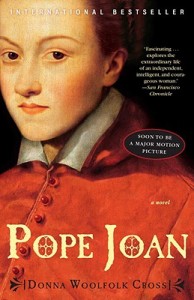 I’ve only just started Pope Joan but I have an exciting opportunity to announce. If you buy a copy of the new and updated Three Rivers Press/Crown Publishing edition of Pope Joan by the end of July, or if you have already, you can send in your receipt to have a chance to win a walk down the red carpet for you and a friend at the movie premiere with the author and her family! You can see all the details and head to the contest here. I’ve only just started Pope Joan but I have an exciting opportunity to announce. If you buy a copy of the new and updated Three Rivers Press/Crown Publishing edition of Pope Joan by the end of July, or if you have already, you can send in your receipt to have a chance to win a walk down the red carpet for you and a friend at the movie premiere with the author and her family! You can see all the details and head to the contest here.
I also have a copy of Pope Joan to give away here at Medieval Bookworm in celebration of the book’s new release. Better yet, the author will inscribe the book to you (or whoever you’d like) and ship internationally! To enter, first leave a comment on this post telling me why you’d like to win this particular book. For additional entries:
- +1 Tweet or blog about the giveaway OR the red carpet contest with a link back to this post.
- +1 Comment on my review post later this week.
- +3 Become a subscriber or tell me that you are already a subscriber!
Don’t forget to tell me that you’ve done these things with links or I won’t be able to count them! This giveaway will be open until Sunday August 2nd. The winner of this contest is Blodeuedd.
Good luck both here and on Donna’s red carpet contest! And I hope you are also having a great reading week!
|
|
 Here’s the description:
Here’s the description:






 Yesterday, I reviewed Carrie’s newest book,
Yesterday, I reviewed Carrie’s newest book,  5. Are you planning on returning to any of the characters in Scoundrel’s Kiss for another book? What’s next for you?
5. Are you planning on returning to any of the characters in Scoundrel’s Kiss for another book? What’s next for you?





 I’ve only just started Pope Joan but I have an exciting opportunity to announce. If you buy a copy of the new and updated Three Rivers Press/Crown Publishing edition of Pope Joan by the end of July, or if you have already, you can send in your receipt to have a chance to win a walk down the red carpet for you and a friend at the movie premiere with the author and her family! You can see all the details and head to the contest
I’ve only just started Pope Joan but I have an exciting opportunity to announce. If you buy a copy of the new and updated Three Rivers Press/Crown Publishing edition of Pope Joan by the end of July, or if you have already, you can send in your receipt to have a chance to win a walk down the red carpet for you and a friend at the movie premiere with the author and her family! You can see all the details and head to the contest 






Recent Comments